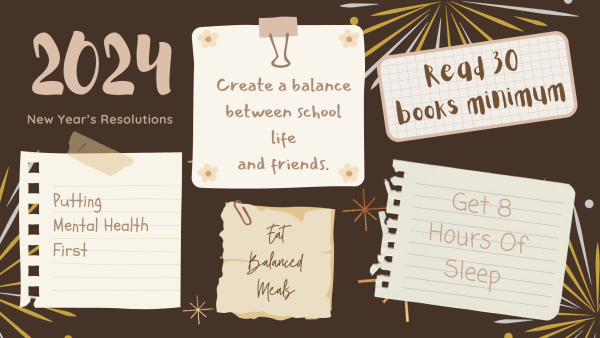It’s December 31st. Time to get out a sheet of paper, or scribble in your notes app. Next year will be different, you tell yourself. You’re going to make some real changes. New Year’s Day arrives, and you’ve made a goal board for 2024, bought yourself a gym membership, maybe skincare items or a mental health journal. But within the month, that goal board is coated in dust, your membership lies in the bottom of your junk drawer, and the New Year’s Resolutions you had so confidently proclaimed less than a month before have already begun to fade. You really thought this year was going to be different. So why is it just the same as always?

At the end of each year, the pressure to create change for the future intensifies, pushing people, particularly women, to change their habits, from physical fitness to mental health. The vast majority of resolutions focus on physical and mental health, whether that be going to therapy, losing weight, or starting on a new diet. As women feel pressured to change their bodies with the holidays ended, and a new year around the corner, the pressure of a New Year’s Resolution can create a toxic and almost fake foundation for change, that preys on one’s insecurities.
According to Forbes, most New Year’s Resolutions only last around 2-3 months, with only 6% of people lasting the full year with their resolution. Many times, when coming up with New Year’s Resolutions, people tend to think too broadly, choosing goals that are unrealistic, and too difficult for them to keep up with over a long period of time. Although these goals can be exciting and promising at the moment, the motivation for them is usually shallow, and lacks meaning, as the main motivation prompting one to change their habits is simply a new year is rolling around.
“It’s really hard to change some aspect of your life drastically, overnight.”
“It’s really hard to change some aspect of your life drastically, overnight,” junior Becca Houlehan said. “Like going cold turkey on junk food, it’s hard to change your habits so quickly and it can lead to someone going too far in the opposite way.”
As much as a positive light is shed on New Year’s Resolutions, the reality is that many times they don’t last. According to the National Institute of Health, habits take around 10 weeks to develop. For New Year’s Resolutions to truly become a new part of you, it takes determination and consistency. You must also start with a smaller goal that’s within reach, one that you know is achievable. By looking at a New Year’s Resolution as a habit you’re trying to build, rather than an exciting spur of the moment drastic change, the possibility of your New Year’s Resolution becomes more of a reality.

“If a person is kind and patient with themselves, and their resolution is manageable then it can work,” Houlehan said. “Just be loving to yourself and don’t expect a miraculous change overnight. It takes work and commitment.”




